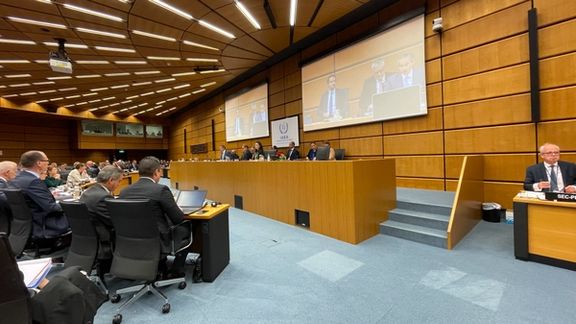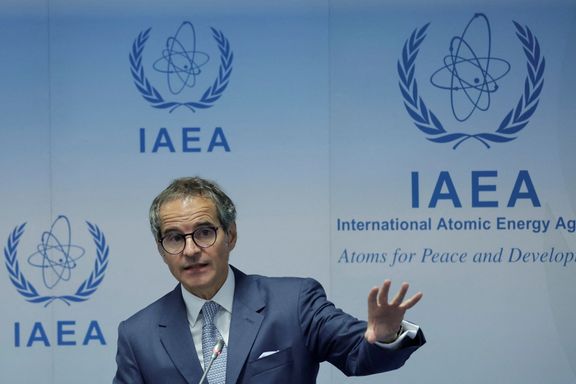E3, US Issue Statement On Iran As UN Nuclear Meeting Opens

As the International Atomic Energy Agency's board of governors began its quarterly meeting Tuesday, countries expressed concerns over Iran’s activities.
The United States delivered a statement on verification and monitoring of Iran’s activities before France, Germany and the UK (E3) also issued a joint statement on Tehran’s implementation of its nuclear commitments under the 2015 JCPOA nuclear deal, which is considered defunct.
Despite criticism by Israel accusing the IAEA of watering down its investigation into Iran's activities, both statements – by the US and the E3 – expressed gratitude to the Agency for its objective reporting on Iran’s nuclear program. “We would like to express our appreciation for the Agency’s professional and impartial work, and in particular, inspections of Iran’s facilities,” read the E3 statement.
Following unusually strong criticism by Israeli Prime Minister Benjamin Netanyahu that accused his agency of "capitulation to Iranian pressure," IAEA Director-General Rafael Grossi told a news conference on Monday that "We never ever, never ever water down our standards.”
Last week the IAEA issued a report saying that Iran had partially cooperated in an investigation about three sites suspected of having been used as secret nuclear locations more than two decades ago.
Iran had tried to stymie the investigation since 2019. The IAEA had repeatedly denounced Iranian stonewalling, which spurred its 35-nation Board of Governors to pass a resolution last year demanding Iran to comply immediately. However, in a report to member states earlier in June, Grossi said Iran had provided explanation about depleted uranium traces at one site.
Although the E3 appreciated the IAEA’s “objective reporting,” they said: “We see no substantial change in Iran’s behavior. Over the reporting period, Iran has unabatedly continued escalating its nuclear program beyond civilian justification, and has displayed little will to implement the transparency commitments laid out in the Joint Statement agreed last March.”

Noting that the Director General’s report shows Iran continues down its path of significant nuclear escalation, they mentioned Tehran's expansion of its stockpile of 5%, 20% and 60% enriched uranium.
Highlighting that Iran’s total enriched uranium stockpile is now more than 21 times the JCPOA limit, the E3 said the stockpile has increased by almost one third, to 114.1 kg in the form of UF6 (uranium hexafluoride or hex).
"This is almost three times the amount of nuclear material from which the possibility of manufacturing a nuclear explosive device cannot be excluded,” they warned.
They also expressed worries about Iran continuing to install additional advanced centrifuge cascades, which permanently improved its enrichment capabilities.
The three also referred to the detection last January of uranium particles enriched to 83.7% U-235, highlighting the seriousness of Iran’s continuing escalation. “This enrichment was grossly inconsistent with the level declared by Iran and constituted an unprecedented and extremely grave development, for which there is no credible civilian justification,” they underlined, adding that the significance of the detection of undeclared changes made to the cascade configuration at Fordow should be fully understood.
“Iran is still using a configuration which can enable the production of highly enriched material at levels considerably over 60%, showing Iran’s disregard for the gravity of this development,” the E3 stated.
They argued that the circumstances of such a discovery “through an unannounced inspection,” as well as the "accumulation of highly enriched uranium continue to ring alarm bells.”
They pointed to Iran’s decision to remove IAEA’s surveillance and monitoring equipment, saying the move had detrimental implications for the Agency’s ability to provide assurance of the peaceful nature of Iran’s nuclear program.
They urged Iran to re-install all equipment in all the locations deemed necessary by the IAEA, and to provide all the footage from the cameras, including data recorded from February 2021 to June 2022, during which the nuclear watchdog had no access to data on centrifuge and component manufacturing.
Referring to the talks to revive the JCPOA, which collapsed due to Iran’s strenuous demands beyond the nuclear accord, they expressed deep regret that Iran did not accept a "fair and balanced deal" tabled by the EU almost a year ago, and instead chose to accelerate its program. “Iran bears full responsibility for this situation.”
The statement by the US was somewhat similar in concept but a little different in wording. Ambassador Laura S.H. Holgate also expressed concern about the enrichment of uranium to 60%, saying, “No other country in the world today utilizes uranium enriched to 60 percent for the purpose Iran claims.”
“Iran argues it is unfairly targeted by others. The reality remains that Iran continues to single itself out through its own actions. Iran should cease its nuclear provocations that pose grave proliferation risks,” read parts of the US statement.
According to the statement, Iran ended hopes of a mutual return to JCPOA implementation last September by demanding that safeguards obligations be implemented differently in Iran than in all other states.
“Such demands are simply impossible to accept” as “nowhere in the world would IAEA inspectors ignore possible undeclared nuclear material and activities, and the detection of nuclear material particles at multiple undeclared locations.”
Earlier in the day, Mohammad Marandi, the advisor to the Iranian negotiating team in the nuclear talks, reiterated that Iran will not sign a nuclear deal until the IAEA declares all outstanding cases resolved.